Related Research Articles
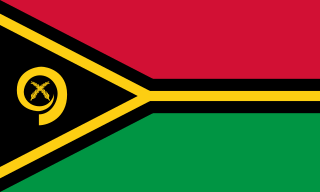
Vanuatu, officially the Republic of Vanuatu, is an island country in Melanesia located in the South Pacific Ocean. The archipelago, which is of volcanic origin, is 1,750 km (1,090 mi) east of northern Australia 540 km (340 mi) northeast of New Caledonia, east of New Guinea, southeast of Solomon Islands, and west of Fiji.
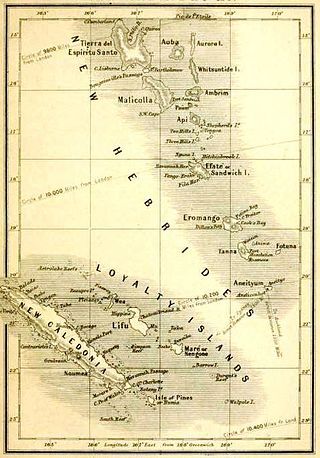
The history of Vanuatu spans over 3,200 years.
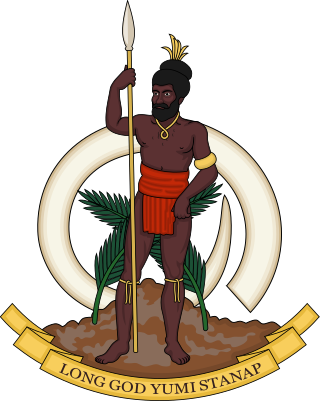
Vanuatu maintains diplomatic relations with many countries, and it has a small network of diplomatic missions. Australia, France, Japan, New Zealand, the People's Republic of China, South Korea and the United Kingdom maintain embassies, High Commissions, or missions in Port Vila. The British High Commission maintained a continued presence for almost a century, though closed from 2005 until reopening in 2019.
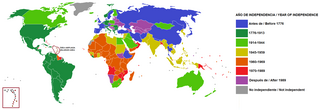
Decolonization is the undoing of colonialism, the latter being the process whereby imperial nations establish and dominate foreign territories, often overseas. The meanings and applications of the term are disputed. Some scholars of decolonization focus especially on independence movements in the colonies and the collapse of global colonial empires.
From 1916 to 1975, Tuvalu was part of the Gilbert and Ellice Islands colony of the United Kingdom. A referendum was held in 1974 to determine whether the Gilbert Islands and Ellice Islands should each have their own administration. As a consequence of the referendum, the separate British colonies of Kiribati and Tuvalu were formed. Tuvalu became fully independent as a sovereign state within the Commonwealth on 1 October 1978. On 5 September 2000, Tuvalu became the 189th member of the United Nations.

The decolonisation of Africa was a series of political developments in Africa that spanned from the mid-1950s to 1975, during the Cold War. Colonial governments gave way to sovereign states in a process often marred by violence, political turmoil, widespread unrest, and organised revolts. Major events in the decolonisation of Africa included the Mau Mau rebellion, the Algerian War, the Congo Crisis, the Angolan War of Independence, the Zanzibar Revolution, and the events leading to the Nigerian Civil War.
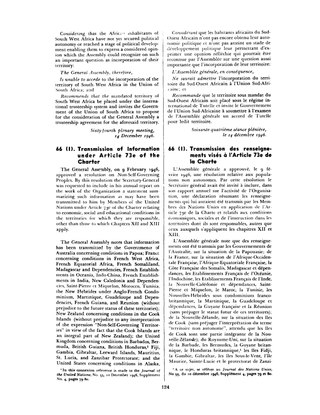
Chapter XI of the United Nations Charter defines a non-self-governing territory (NSGT) as a territory "whose people have not yet attained a full measure of self-government". Chapter XI of the UN Charter also includes a "Declaration on Non-Self-Governing Territories" that the interests of the occupants of dependent territories are paramount and requires member states of the United Nations in control of such territories to submit annual information reports concerning the development of those territories. Since 1946, the UNGA has maintained a list of non-self governing territories under member states' control. Since its inception, dozens of territories have been removed from the list, typically when they attained independence or internal self-government, while other territories have been added as new administering countries joined the United Nations or the UN General Assembly (UNGA) reassessed their status.
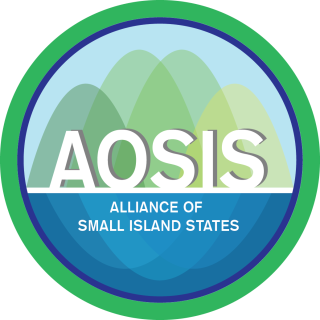
Alliance of Small Island States (AOSIS) is an intergovernmental organization of low-lying coastal and small island countries. AOSIS was established in 1990, ahead of the Second World Climate Conference. The main purpose of the alliance is to consolidate the voices of Small Island Developing States (SIDS) to address global warming.

The Small Island Developing States (SIDS) are a grouping of developing countries which are small island countries and small states that tend to share similar sustainable development challenges. These include small but growing populations, limited resources, remoteness, susceptibility to natural disasters, vulnerability to external shocks, excessive dependence on international trade, and fragile environments. Their growth and development are also held back by high communication, energy and transportation costs, irregular international transport volumes, disproportionately expensive public administration and infrastructure due to their small size, and little to no opportunity to create economies of scale. They consist of some of the most vulnerable countries to anthropogenic climate change.

The United Liberation Movement for West Papua (ULMWP) is an organization formed from the merger of three political independence movements seeking independence for Western New Guinea from Indonesia. The ULMWP was formed on 7 December 2014 in Vanuatu uniting the Federal Republic of West Papua (NRFPB), the West Papua National Coalition for Liberation (WPNCL) and the National Parliament of West Papua (NPWP).
Islands First is a non-governmental organization working on behalf of the Small Island Developing States to confront the challenges of climate change, the depletion of ocean resources, and ocean level's rise.
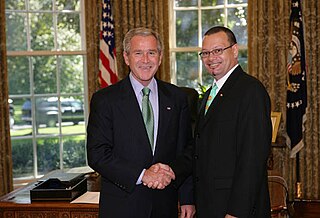
Ronald Jean Jumeau is a Seychellois political figure and diplomat. He is currently the New York-based roving Ambassador for Climate Change and Small Island Developing State Issues of the Republic of Seychelles since 2012. Previously, Ambassador Jumeau has held various ministerial positions in the government from 1998 to 2007, and adopted the role of Permanent Representative of the Seychelles to the United Nations and Ambassador to the United States from 2007-2012.

The French Republic and the Republic of Vanuatu have long-standing bilateral relations which have varied over the years between tense and amicable. Vanuatu, then known as the New Hebrides, was a Franco-British condominium from 1906 to 1980, and maintained formal relations with both of its former colonial masters after gaining independence. Franco–Vanuatuan relations were rocked by a series of crises in the 1980s, and broke down completely on several occasions, with Vanuatu expelling the French ambassador in 1981, in 1984 and in 1987. Relations improved from the 1990s onwards and, today, France provides development aid to Vanuatu. The two countries also share amicable economic and cultural relations; both are members of the Organisation internationale de la Francophonie.

France – Papua New Guinea relations are the foreign relations between France and Papua New Guinea. Official diplomatic relations were established in 1976. France has an embassy in Port Moresby but Papua New Guinea has no diplomatic representation in France. Papua New Guinea's embassy in Brussels covers France.

The Republic of Vanuatu has been a member of the United Nations since the year of its independence in 1980. The country was a particularly active member in the 1980s, when, governed by Prime Minister Father Walter Lini and represented by Ambassador Robert Van Lierop, it was a consistent advocate for decolonisation. Subsequently, its emphasis within the United Nations shifted to the issue of climate change and the vulnerability of Small Island Developing States.
The decolonisation of Oceania occurred after World War II when nations in Oceania achieved independence by transitioning from European colonial rule to full independence.

The United Nations Special Committee on the Situation with Regard to the Implementation of the Declaration on the Granting of Independence to Colonial Countries and Peoples, or the Special Committee on Decolonization (C-24), is a committee of the United Nations General Assembly that was established in 1961 and is exclusively devoted to the issue of decolonization.
Ngedikes "Olai" Uludong is a Palauan diplomat, currently serving as the Permanent Representative from Palau to the United Nations and the Palau Ambassador to the European Union in the Kingdom of Belgium. Prior to her role as a diplomat, Uludong was Climate Change Advisor in environmental policy and management throughout the Micronesia and Pacific region. She is an active public servant that has coordinated environment and climate change work in the Republic of Palau, Republic of the Marshall Islands, Republic of Nauru, Republic of Maldives, the United Nations Framework Convention on Climate Change (UNFCCC) process, and served as the Lead Negotiator for the United Nations Negotiating Bloc: The Alliance of Small Islands States (AOSIS) in New York City. As the Current Palau's Ambassador to the European Union and Ambassador on Climate Change.
Walton Alfonso Webson is an Antiguan diplomat. He has served as the Permanent Representative to the United Nations in New York of Antigua and Barbuda since 2014. He was President of the UNICEF Executive Board at the international level in 2017.
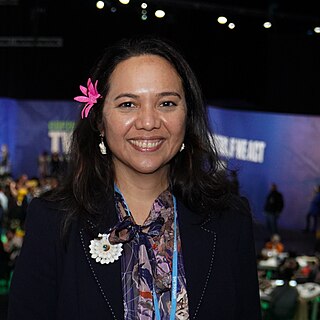
Tina Stege is the Climate Envoy for the Marshall Islands (RMI). The RMI is one of the countries in the world most vulnerable to climate change, mainly as a result of rising sea levels. Stege has represented her country at the 2019 United Nations Climate Change Conference (COP25) held in Madrid, Spain, the 2021 Conference (COP26) held in Glasgow, Scotland, the 2022 Conference (COP27) held in Sharm El Sheikh, Egypt, the 2023 Conference (COP28), held in Dubai, and the 2024 Conference (COP29), held in Baku, Azerbaijan. She has also been a spokesperson for the RMI on the impacts of nuclear testing.
References
- ↑ "Black Renaissance Film Society Announces its Inaugural Film Series", New York University
- ↑ Minter, William. "Interview with Robert Van Lierop". www.noeasyvictories.org. Retrieved 1 February 2021.
- ↑ "The Alliance of Small Island States (AOSIS): The International Conscience", Asia-Pacific Magazine, may 2, 1996
- ↑ "In Harlem, Echo of Eloquent Dreams", New York Times, October 16, 2008
- 1 2 "Black Renaissance Film Society Announces its Inaugural Film Series", New York University
- ↑ Luís Carlos Patraquim (2005). Médias, pouvoir et identités. KARTHALA Editions. p. 270. ISBN 978-2-84586-594-5.
- 1 2 Huffer, Elise (1993). Grands hommes et petites îles: la politique extérieure de Fidji, de Tonga, et du Vanuatu. ORSTOM. pp. 272–273. ISBN 2-7099-1125-6.
- ↑ "Africana Diplomacy: The U.N. Experience on April 2" Archived 2008-11-19 at the Wayback Machine , Seton Hall University, March 28, 2008
- ↑ "Climate Change and Small Island States: The Alliance of Small Island States (AOSIS)" Archived 2008-11-01 at the Wayback Machine , United Nations Economic and Social Commission for Asia and the Pacific, 2000
- ↑ "Momentum Towards the Success of Sixth Conference of the Parties to the United Nations Framework Convention on Climate Change" Archived 2008-10-21 at the Wayback Machine , Vanuatu government website, September 2000
- ↑ "US feels heat on global warming stance", New Scientist, February 16, 1991
- ↑ "Programme for special UN Decade on decolonization considered - International Decade for the Eradication of Colonialism", UN Chronicle , March 1990
- ↑ "DPI/NGO CONFERENCE EXAMINES UNIVERSALITY OF HUMAN RIGHTS IN CONTEXT OF DIVERSE CULTURES", United Nations Press Release, September 14, 1998
- ↑ "Officers elected at COP 18/CMP 8", UNFCCC Official Document, December 8, 2012